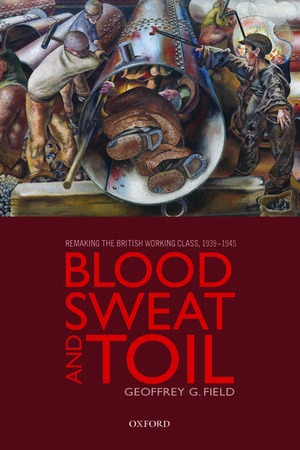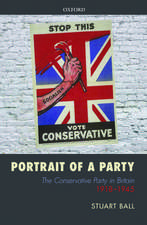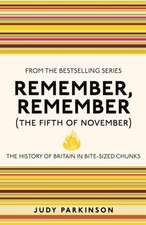Blood, Sweat, and Toil: Remaking the British Working Class, 1939-1945
Autor Geoffrey G. Fielden Limba Engleză Paperback – 7 noi 2013
| Toate formatele și edițiile | Preț | Express |
|---|---|---|
| Paperback (1) | 331.01 lei 31-37 zile | |
| OUP OXFORD – 7 noi 2013 | 331.01 lei 31-37 zile | |
| Hardback (1) | 836.47 lei 31-37 zile | |
| OUP OXFORD – 3 noi 2011 | 836.47 lei 31-37 zile |
Preț: 331.01 lei
Preț vechi: 376.38 lei
-12% Nou
Puncte Express: 497
Preț estimativ în valută:
63.34€ • 66.30$ • 52.72£
63.34€ • 66.30$ • 52.72£
Carte tipărită la comandă
Livrare economică 19-25 martie
Preluare comenzi: 021 569.72.76
Specificații
ISBN-13: 9780199675364
ISBN-10: 0199675368
Pagini: 416
Ilustrații: 10 black and white illustrations
Dimensiuni: 156 x 236 x 23 mm
Greutate: 0.63 kg
Editura: OUP OXFORD
Colecția OUP Oxford
Locul publicării:Oxford, United Kingdom
ISBN-10: 0199675368
Pagini: 416
Ilustrații: 10 black and white illustrations
Dimensiuni: 156 x 236 x 23 mm
Greutate: 0.63 kg
Editura: OUP OXFORD
Colecția OUP Oxford
Locul publicării:Oxford, United Kingdom
Recenzii
increases our understanding of an important, still imperfectly understood time, helping to clarify how a substantial, unprecedented shift towards a more equal society was achieved, incomplete and impermanent though it turned out to be
[Field] has refocused our minds on class, has proposed some credible hypotheses, and has done much to illuminate them. His book will repay rereading, and is likely to become a key point of reference in the literature. He and the publishers are to be congratulated upon it.
It is to be hoped that Geoffrey Field's comprehensive and thought-provoking book will make a major critical contribution to the seemingly endless process of repositioning the Second World War in popular understanding.
It is an important contribution to a growing body of scholarship which reasserts the centrality of class in shaping social identities and politics in the middle years of the twentieth century; as such it deserves the widest possible readership.
in its challenge to the triumphalist narrative of the war, Field's study has staying power. Blood, Sweat, and Toil will perhaps have its greatest afterlife in the classroom ... The individual chapters on women's mobilization, evacuees, the Blitz, industrial relations and trade unions, or the military could surely provide undergraduates with a more complex survey of Britain's "good war," including the serious class tensions that shaped the wartime experience.
[Field] has refocused our minds on class, has proposed some credible hypotheses, and has done much to illuminate them. His book will repay rereading, and is likely to become a key point of reference in the literature. He and the publishers are to be congratulated upon it.
It is to be hoped that Geoffrey Field's comprehensive and thought-provoking book will make a major critical contribution to the seemingly endless process of repositioning the Second World War in popular understanding.
It is an important contribution to a growing body of scholarship which reasserts the centrality of class in shaping social identities and politics in the middle years of the twentieth century; as such it deserves the widest possible readership.
in its challenge to the triumphalist narrative of the war, Field's study has staying power. Blood, Sweat, and Toil will perhaps have its greatest afterlife in the classroom ... The individual chapters on women's mobilization, evacuees, the Blitz, industrial relations and trade unions, or the military could surely provide undergraduates with a more complex survey of Britain's "good war," including the serious class tensions that shaped the wartime experience.
Notă biografică
Geoffrey Field received his undergraduate degree in history from Oxford University and a Ph.D from Columbia University. His research and publications have focused on twentieth-century German and British history and European racism. His book, Evangelist of Race: The Germanic Vision of Houston Stewart Chamberlain, won the Anisfield-Wolf Award for the best book on race relations in any discipline and an Outstanding Book of the Year Award from Choice. He has been a visiting professor at the Ecole des Hautes Etudes en Sciences Sociales, Paris, and the University of Paris, 13. He is also a former Chair of the New York Council for the Humanities, was a Senior Editor of International Labor and Working-Class History, and continues to serve on the journal's editorial board.














